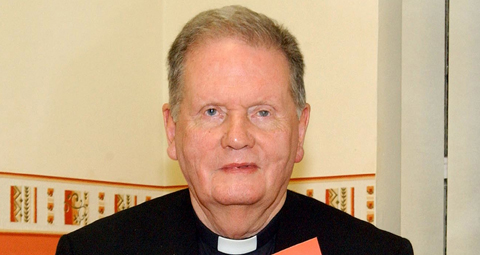BY Ian Dunn | September 15 | ![]() 0 COMMENTS
0 COMMENTS ![]() print
print

Bishop Taylor praises Pope for ceding liturgy translation power
A Scottish bishop who formerly chaired the committee overseeing the translation of the liturgy into English has Pope Francis has rectified an ‘injustice’ by granting bishops’ conferences greater control over the translation of liturgical texts.
Bishop Emeritus Maurice Taylor of Galloway said he welcomed the publication last weekend of the motu proprio Magnum Principium as it would correct a situation ‘which had resulted in the work of translating texts being seriously affected and damaged.’
Until now, Canon 838 has stated that ‘the direction of the sacred liturgy depends solely on the authority of the Church which resides in the Apostolic See and, according to the norm of law, the diocesan bishop.’
The second paragraph said it was ‘for the Apostolic See to order the sacred liturgy of the universal Church, publish liturgical books and review their translations in vernacular languages, and exercise vigilance that liturgical regulations are observed faithfully everywhere.’
Bishop Taylor, who was chair of the Episcopal Board of the International Commission on English in the Liturgy (ICEL) from 1997-2002, said ‘there was an instruction called Liturgiam authenticam issued by the Vatican in 2001 by which the only acceptable translation was a total subjection of the ‘receiving language’ to every detail of Latin syntax and style.
The result has been a word-for-word translation which, in English (and other languages) has resulted in ‘stilted, awkward texts, difficult to read aloud and even more difficult for listeners to understand.’
He also said that the ‘Holy See has consistently exaggerated the control which the Second Vatican Council decreed that Rome should have over the translations of liturgical texts submitted by bishops’ conferences. This situation has now been rectified by Pope Francis, he said.
Rome will still have its authority but local bishops’ conferences will have the right to make accurate translations in appropriate wording and have them accepted by the Holy See.
However he added that there were practical reasons why there may be no change to liturgy in the near future.
“The long delay since the present Missal came into use raises an anxiety about the feasibility of early use of the new regulation,” he said. “A great deal of money has been spent, both by parishes as well as by many individual Catholics, on buying copies of the present Missal.
“Moreover, will parishioners not be justified in saying: ‘We have got used to the present translation and don’t want to have yet another change.’”
He added: “At present, bishops’ conferences are busily engaged in examining, reviewing and assessing liturgical texts for the sacraments and other ceremonies.
“These are all composed according to the dictates of the now superseded Liturgiam authenticam. Are Episcopal waste paper baskets soon to be filled to overflowing?’










